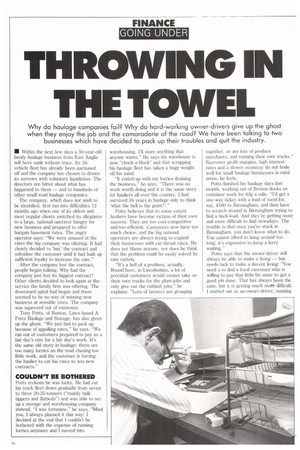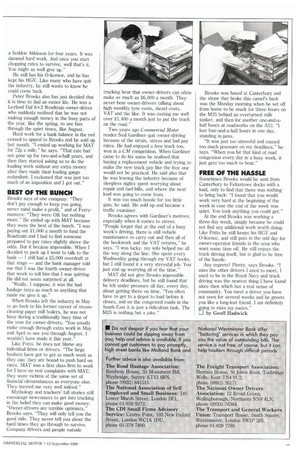THROWING IN THE TOWEL
Page 36

Page 37

If you've noticed an error in this article please click here to report it so we can fix it.
Why do haulage companies fail? Why do hard-working owner-drivers give up the ghost when they enjoy the job and the camaraderie of the road? We have been talking to two businesses which have decided to pack up their troubles and quit the industry.
• Within the next few days a 50-year-old family haulage business from East Anglia will have sunk without trace. Its 16vehicle fleet has already been auctioned off and the company has chosen to drown its sorrows with voluntary liquidation. The directors are bitter about what has happened to them — and to hundreds of other small road haulage companies.
The company, which does not wish to be identified, first ran into difficulties 12 months ago when one of its oldest and most regular clients switched its allegiance to a large, national operator hungry for new business and prepared to offer bargain basement rates. The angry operator says: "We were amazed at the rates the big company was offering. It had clearly decided to 'buy' the contract and subsidise the customer until it had built up sufficient loyalty to increase the rate."
After the company lost the contract, people began talking. Why had the company just lost its biggest contract? Other clients decided to look again at the service the family firm was offering The downward spiral had begun and there seemed to be no way of winning new business at sensible rates. The company was squeezed out of existence.
Tony Potts, of Boston, Lines-based A Potts Haulage and Storage, has also given up the ghost. "We just had to pack up because of appalling rates," he says. "We ran out of customers prepared to pay us a fair day's rate for a fair day's work. It's the same old story in haulage; there are too many lorries on the road chasing too little work, and the customer is forcing the haulier to cut his rates to win new contracts."
COULDN'T BE BOTHERED
Potts reckons lie was lucky. He had cut his truck fleet down gradually from seven to three 20-25-tonners ("mainly bulk tippers and flatbeds") and was able to set up a storage and warehousing company instead. "I was fortunate," he says. "Mind you, I always planned it this way: I decided at the end that I couldn't be bothered with the expense of running lorries anymore and I moved into warehousing. I'll store anything that anyone wants." He says his warehouse is now "chock-a-block" and that scrapping his haulage fleet has taken a huge weight off his mind.
"It ended up with my lorries draining the business," he says. "There was no work worth doing and it is the same story for hauliers all over the country. I had survived 16 years in haulage only to think 'what the hell is the point?'."
Potts believes that to some extent hauliers have become victims of their own success. They are too cost-competitive and too efficient. Customers now have too much choice, and the big national operators are always trying to expand their businesses with cut-throat rates. He does not blame anyone, nor does he think that the problem could be easily solved by rate cartels.
"It's a hell of a problem, actually. Round here, in Lincolnshire, a lot of potential customers would sooner take on their own trucks for the plum jobs and only give out the rubbish jobs," he explains. "Lots of farmers are grouping together, as are lots of produce merchants, and running their own trucks." Narrower profit margins, high interest rates and a slower economy do not bode well for small haulage businesses in rural areas, he feels.
Potts finished his haulage days last month, working out of Boston docks on container work for 62p a mile. "I'd get a one-way ticket with a load of steel for, say, ,U60 to Birmingham, and then have to scratch around in Birmingham trying to find a back-load. And they're getting more and more difficult to find nowadays. The trouble is that once you're stuck in Birmingham, you don't know what to do. You cannot afford to hang around too
long; expensive to keep a lorry waiting."
Potts says that the owner-driver will always be able to make a living — but needs luck to make a decent living: "You need a to find a loyal customer who is willing to pay that little bit more to get a good job done. That has always been the case, but it is getting much mote difficult. I started out as an owner-driver, running a Seddon Atkinson for four years. It was damned hard work. And once you start chopping rates to survive, well that's it. You might as well give up."
He still has his 0-licence, and he has kept his HGV. Like many who have quit the industry, he still wants to know he could come back.
Peter Brooks also has just decided that it is time to find an easier life. He was a Leyland Daf 6 x 2 Roadtrain owner-driver who suddenly realised that he was not making enough money in the busy parts of the year, like the spring, to see him through the quiet times, like August.
Hard work for a bank balance in the red ceased to appeal to Brooks and he sold up last month. "I ended up working for MAT for 72p a mile," he says. "That rate had not gone up for two-and-a-half years, and then they started asking us to do the loading work without any extra money after they made their loading gangs redundant. I reckoned that was just too much of an imposition and I got out."
BEST OF THE BUNCH
Brooks says of one company: "They don't pay enough to keep you going, never mind make a profit," and of Ferrymasters: "They were OK but nothing more." He ended up with MAT because they were the best of the bunch. "I was paying out 21,000 a month to fund the Roadtrain and I had to find someone prepared to pay rates slightly above the odds. But it became impossible. When I decided to pack up I went to talk to the bank — I still had a 25,000 overdraft at that stage — and the bank manager told me that I was the fourth owner-driver that week to tell him that [was quitting. He did not seem surprised at all.
"Really, I suppose, it was the bad haulage rates as much as anything that made me give it up."
When Brooks left the industry in May to go back to his former career of steamcleaning paper mill boilers, he was not busy during a traditionally busy time of the year for owner-drivers. "You usually make enough through extra work in May and April to see you through August. 1 wouldn't have made it this year."
Like Potts, he does not blame any individual firms or drivers. "The large hauliers have got to get as much work as they can: they are bound to push hard on rates. mAT was a first class firm to work for.I have no real complaints with MAT; they were victims of the same set of financial circumstances as everyone else. They treated me very well indeed."
Mythology and truckers' tall stories still encourage newcomers to get into trucking in the belief they can make good money. "Owner-drivers are terrible optimists,'' Brooks says. "They will only tell you the good side. They never tell you about the hard times they go through to survive. Company drivers and people outside trucking hear that owner-drivers can often make as much as 26,000 a month. They never hear owner-drivers talking about high monthly tyre costs, diesel costs, VAT and the like. It was costing me well over 21,400 a month just to put the truck on the road."
Two years ago Commercial Motor reader Neil Gardiner quit owner-driving because of the strain, stress and bad pay rates. He had enjoyed a free truck too, won in a CM competition. When Gardiner came to do his sums he realised that buying a replacement vehicle and trying to make .the new truck pay like the free one would not be practical. He said also that he was leaving the industry because of sleepless nights spent worrying about repair and fuel bills, and where the next load was going to come from.
It was too much hassle for too little gain, he said. He sold up and became a traffic examiner.
Brooks agrees with Gardiner's motives, especially when it comes to stress. "People forget that at the end of a busy week's driving, there is still vehicle maintenance to carry out and then all of the bookwork and the VAT returns," he says. "I was lucky, my wife helped me all the way along the line. She spent every Wednesday going through my VAT books, but I still found it a very stressful job. You just end up worrying all of the time."
MAT did not give Brooks impossible delivery deadlines, but he still found that he felt under pressure all day, every day, about getting there on time. "You often have to get to a depot to load before it closes, and on the congested roads in the South East it is just a ridiculous task. The M25 is nothing but a joke." Brooks was based at Canterbury and the straw that broke this camel's back was the Monday morning when he set off from home to be stuck for three hours on the M25 behind an overturned milk tanker, and then for another one-and-ahalf hours at roadworks on the Al2. "I lost four-and-a-half hours in one day, standing in jams.
"It was just too stressful and caused too much pressure on my deadlines," he. says. "When you hit that kind of road congestion every day in a busy week, it just gets too much to bear."
FREE OF THE HASSLE
Sometimes Brooks would be sent from Canterbury to Felixstowe docks with a load, only to find that there was nothing to bring back: "1 found that you would work very hard at the beginning of the week in case the end of the week was quiet. You took anything you could get" At the end Brooks was working a three-day week, simply because he could not find any additional work worth doing. Like Potts he still keeps his HGV and 0-licence, and still puts in the odd day for owner-operator friends in the area who want some time off. He still enjoys the truck driving itself, but is glad to be free of the hassle.
Any regrets? Plenty, says Brooks. "I miss the other drivers I used to meet. I used to be in the Royal Navy and truck driving was the nearest thing I have found since then which has a real sense of community. You meet a driver you have not seen for several weeks and he greets you like a long-lost friend. I am definitely Eing to miss my mates."
Ll by Geoff Hadwick




















































































































